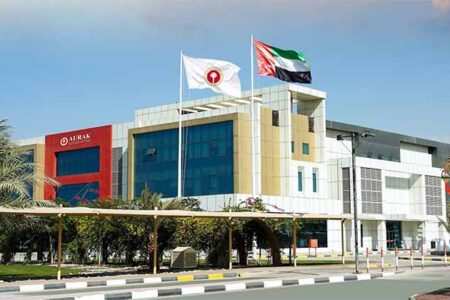A study by two UAE-based researchers has demonstrated that incorporating recycled materials into pavement construction yields substantial economic, environmental, and public health benefits.
The research involved a life cycle assessment (LCA) of the 8-km rehabilitated Al Ittihad Taween Road that connects two major highways (E 11 and E 311) in Ras Al Khaimah. The LCA study assessed the economic, environmental and public health impacts of various scenarios, including the current design which is based on a traditional pavement design.
According to the findings, incorporating recycled plastic and reclaimed asphalt pavement (RAP) delivers significant environmental benefits which include reduction of Greenhouse Gases (GHGs) and air pollutants, as well as increasing the energy and water efficiency of pavement construction. RAP refers to reprocessed pavement materials containing asphalt and aggregates.
The study was conducted by Prof. Hamed Assaf, from the Department of Civil and Infrastructure Engineering, American University of Ras Al Khaimah (AURAK), and Prof. Ahmad Abu Abdo, from the Department of Civil Engineering, Liwa College of Technology, Abu Dhabi.
Prof. Stephen Wilhite, Senior Vice President of Academic Affairs and Student Success and Provost at AURAK, says: “This research assumes major significance, since road construction results in the release of significant amounts of greenhouse gases and air and water pollutants. The study addresses the gap in LCA studies by focusing on the environmental and public health impact of incorporating recycled material into pavement construction in the UAE. This research reflects AURAK’s high standards of research into creating solutions to some of today’s pressing problems.”
Prof. Hamed Assaf said: “The aim of the study was to demonstrate hypothetical benefits of pavement construction using recycled materials. Whereas RAP should replace conventional materials at rates well above 10% to yield these benefits, recycled plastic offers more superior environmental performance at varying replacement rates. Environmental benefits include reduction of Greenhouse Gases (GHGs) and air pollutants as well as increasing the energy and water efficiency of pavement construction.”
The goal of the study was to develop a case study to demonstrate the potential economic, environmental, and public health benefits of utilizing recycled materials – recycled plastic and RAP – in pavement construction in the UAE. This could provide decision-makers with valuable insight into the main issues influencing sustainability in road construction.
Currently, materials typically used in pavement construction include bitumen, gravel, sand, and natural aggregates, in addition to water. However, these have several drawbacks, including high costs and depletion of natural resources. According to the study, using recycled plastics as replacement for pavement binders and fine aggregates offers many advantages, such as less wastage that would have caused damage to the environment, less consumption of energy, water, and natural resources, and less release of harmful pollutants.
While the UAE is yet to experiment with recycled materials in pavement construction, recycled plastic has been used in this construction in several countries, including India, the Netherlands, Canada, Australia, and the USA.
The results from the study were published in 2024 in the Q1 Journal of King Saud University – Engineering Sciences (Volume 36, pages 473–484). The paper is cited below:
Assaf, H., and Abu Abdo, A. (2022). Life cycle assessment of incorporating recycled materials in pavement design. Journal of King Saud University – Engineering Sciences. DOI: https://doi.org/10.1016/j.jksues.2022.04.001
